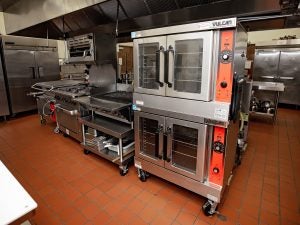October 20, 2020
SHL food course pivots

Andrew Kensey puts food items in a bag for students to pick-up in the Golden Corral Culinary Center in the Rivers Building. (Photo by Rhett Butler)
On East Carolina University’s campus in the Rivers Building is the Golden Corral Culinary Center, a 2,300-square-foot space dedicated in 2009 thanks to a $200,000 renovation gift from Golden Corral to the School of Hospitality Leadership (SHL).
Typically, the Golden Corral Center holds 18-20 students taking the food preparation course principles, which includes lecture and lab. The course is offered as part of the SHL’s core curriculum and introduces students to cooking principles and a simulated commercial kitchen — the Golden Corral Culinary Center. Students would have access to eight six-burner gas ranges and worktables, as well as refrigeration and storage units and large sinks for ware-washing and sanitation. They would learn techniques and principles that cover proper sanitation, safety procedures, cooking and baking best practices, recipe costing and other topics.
The food preparation course is very hands-on and takes place under the watchful eyes and tutelage of instructors Dr. Jacqui de Chabert Rios and Penny Prichard and teaching assistants Taiya Griffin and Andrew Kensey. Their goal is to offer a comprehensive educational experience in a safe environment.
Today that safe environment is driven by COVID, and this fall, face-to-face courses had to be adapted for online.
“At first, adjusting to the online classes was a rocky road, but as always, we attacked the situation with a great plan,” said Kensey.
Let’s go to the video
Because of the new hybrid format, the instructors created and recorded video demonstrations of the cooking and culinary techniques used in a commercial kitchen. For the hands-on portion of the instruction, students relied on their own kitchens and used ingredients provided by the SHL and assembled by Kensey and Griffin. Following COVID protocols, students were assigned specific times to pick up their food.
“We distributed about 50 different items to the students so they would not need to purchase expensive one-recipe items,” Pritchard. “We tried to help them out as much as possible.”
Equipped with video instruction, provided food and their kitchens, students prepared meals as Chabert Rios and Pritchard provided coaching and assessment through a live video stream.

SHL Instructor Penny Prichard, right, provides food preparation assessment to junior Krystyna Carpenter during a live video stream, a pivot away from instruction that traditionally would have taken place in the Golden Corral Culinary Center.
(Contributed photo)
Krystyna Carpenter is a junior and was looking forward to getting into the Golden Corral Culinary Center and learning new techniques alongside professionals. She admits she was “bummed” to hear that the classes went online.
“Though cooking in my kitchen has not been ideal for the lab, I have enjoyed learning new techniques and practicing them in a space where I am comfortable,” said Carpenter. “Chef Prichard has encouraged us throughout each video call, has answered any questions we may have had while cooking, and has shown us firsthand procedures that we were able to mimic during the lab sessions.”
According to SHL director Dr. Bob O’Halloran, participating students and faculty were pleased with the results. He’s not surprised by the course’s success because of the planning that went into it.
“When looking at the course this past summer, Dr. Chabert Rios and Ms. Prichard considered what was really important about the class,” said O’Halloran. “We looked at what we wanted the students to learn, rather than approaching it from how to pivot from a hands-on instruction to an online learning environment.”
“I am thrilled with the success of this online lab experience,” said Prichard. “I feel as though I have more contact with the students, rather than less. I can closely watch what they are doing as they are doing it and give correcting comments on time. When a student asks me a question, all the students learn from my answer.”
Business as Usual
According to O’Halloran, SHL had already laid the groundwork for this success three years ago.
“The summer version of the food preparation class was already online,” said O’Halloran. “We have a dedicated number of undergrad students who are seeking their degrees online and this existing option gives them more flexibility around their work schedules and personal situations.”
One difference with this course going online in the fall centers around the food distribution. Where this fall’s class picked up ingredients in person, summer online students traditionally paid for their ingredients out of their pockets, which could change according to O’Halloran.
“We’re currently working with the University to establish protocols that will allow us to reimburse out-of-pocket expenses for summer online undergrads,” said O’Halloran.
Added O’Halloran, “the online student market is a huge opportunity for us. In today’s environment, you have to provide options to serve the needs of our students.”
And for those undergrad online students looking to continue their education, SHL offers a graduate hospitality management certificate and a Master of Science in Sustainable Tourism and Hospitality degree, both of which are 100% online.

